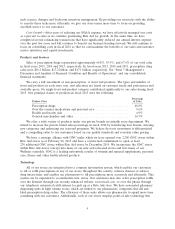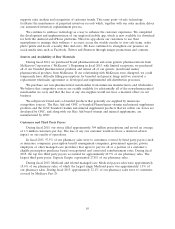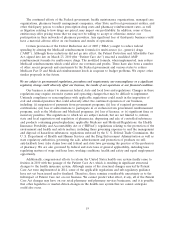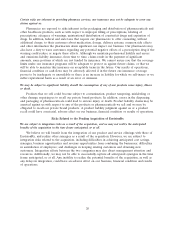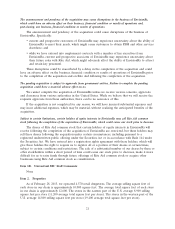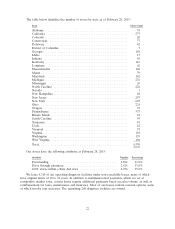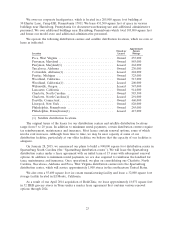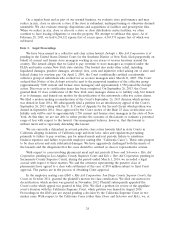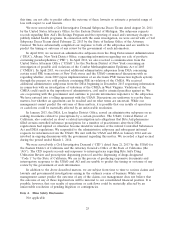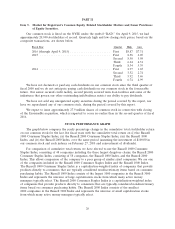Rite Aid 2015 Annual Report Download - page 16
Download and view the complete annual report
Please find page 16 of the 2015 Rite Aid annual report below. You can navigate through the pages in the report by either clicking on the pages listed below, or by using the keyword search tool below to find specific information within the annual report.Risks Related to our Operations
We need to improve our operations in order to improve our financial condition, but our operations will not
improve if we cannot effectively implement our business strategy or if our strategy is negatively affected by
worsening economic conditions.
We have not yet achieved the sales productivity level of our major competitors. We believe that
improving the sales of existing stores is important to improving profitability and operating cash flow. If
we are not successful in implementing our strategies, including our efforts to increase sales and further
reduce costs, or if our strategies are not effective, we may not be able to improve our operations. In
addition, any further adverse change or continued weakness in general economic conditions or major
industries can adversely affect drug benefit plans and reduce our pharmacy sales. Adverse changes in
general economic conditions could affect consumer buying practices and consequently reduce our sales
of front end products, and cause a decrease in our profitability. Failure to improve operations or a
continued weakness in major industries or general economic conditions would adversely affect our
results of operations, financial condition and cash flows and our ability to make principal or interest
payments on our debt.
We purchase all of our brand and generic drugs from a single wholesaler. A disruption in this relationship
may have a negative effect on us.
We purchase all of our brand prescription and, with limited exceptions, all of our generic drugs
from a single wholesaler, McKesson. Pharmacy sales represented approximately 68.8% of our total sales
during fiscal 2015. While we believe that alternative sources of supply for most generic and brand name
pharmaceuticals are readily available, a significant disruption in our relationship with McKesson could
make it difficult for us to continue to operate our business on a regular basis until we executed a
replacement wholesaler agreement or developed and implemented self-distribution processes. We
believe we could obtain and qualify alternative sources, including through self-distribution, for
substantially all of the prescription drugs we sell on an acceptable basis, and accordingly that the
impact of any disruption would be temporary. In addition, because McKesson acts as a wholesaler for
drugs purchased from ultimate manufacturers worldwide, any disruption in the supply of a given drug
could adversely impact McKesson’s ability to fulfill our demands, which could adversely affect us.
A significant disruption in our computer systems or a cyber security breach could adversely affect our
operations.
We rely extensively on our computer systems, including those used by RediClinic and Health
Dialog, to manage our ordering, pricing, point-of-sale, inventory replenishment and other processes.
Our systems are subject to damage or interruption from power outages, computer and
telecommunications failures, computer viruses, cyber security breaches, vandalism, severe weather
conditions, catastrophic events and human error, and our disaster recovery planning cannot account for
all eventualities. Although we deploy a layered approach to address information security threats and
vulnerabilities, including ones from a cyber security standpoint, designed to protect confidential
information against data security breaches, a compromise of our information security controls or of
those businesses with whom we interact, which results in confidential information being accessed,
obtained, damaged or used by unauthorized or improper persons, could harm our reputation and
expose us to regulatory actions and claims from customers and clients, financial institutions, payment
card associations and other persons, any of which could adversely affect our business, financial position
and results of operations. Moreover, a data security breach could require that we expend significant
resources related to our information systems and infrastructure, and could distract management and
other key personnel from performing their primary operational duties. If our systems are damaged, fail
to function properly or otherwise become unavailable, we may incur substantial costs to repair or
replace them, and may experience loss of critical data and interruptions or delays in our ability to
16





